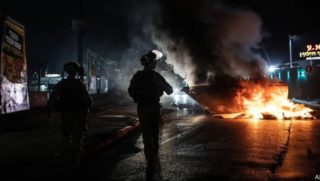LOD – FOR THE past four days, the world has anxiously watched Israel’s border with Gaza, where, on the Israeli side, infantry and armoured battalions have been massing. Palestinian militants in Gaza have launched hundreds of rockets at Israel, which has responded with hundreds of air strikes. Scores of people have already been killed, mostly Palestinians. Then, on May 14th, the Israeli army launched a big new attack on Hamas, the Islamist group that rules Gaza. The offensive included dozens of air strikes and artillery barrages. Hamas then fired more rockets.
“We will continue to do what we’re doing with great intensity,” said Binyamin Netanyahu, Israel’s prime minister. “This operation will continue as long as necessary.” But Mr Netanyahu also has problems at home. In cities and towns across Israel, Arabs and Jews—all Israeli citizens with supposedly equal status—have clashed. Rioting and mob violence have left places such as Lod also looking like war zones: a line of burnt-out vehicles extended from the central marketplace to the city’s entrance. Israeli leaders warned of civil war. “There is no greater threat now than these riots,” said Mr Netanyahu a day before the Gaza offensive.
Relations between Israel’s Jewish majority and its Palestinian citizens, who make up 20% of the population, have never been great. But the country has not seen unrest like this since 2000, when some Arab Israelis protested in solidarity with their kin under occupation in Gaza and the West Bank during the second intifada. Today the violence is widespread. In Acre a rampaging mob torched a hotel, restaurant and shops owned by Jews. On the roads in the Negev desert, Bedouins stoned Jewish drivers. In Jaffa, a 19-year-old soldier was beaten and his skull fractured by Arabs.
But after two nights in which Arabs accounted for most of the violence, far-right Jewish thugs, football hooligans and settlers from the West Bank joined the fray. In Bat Yam, a suburb of Tel Aviv, they destroyed Arab-owned shops. A video shared widely on social media showed Jews pulling a man, presumed to be Arab, from his car and beating him. They kicked and punched him, even as he lay prone on the ground. In south-eastern Tel Aviv, neighbourhood Jewish vigilantes looking for Arab targets attacked reporters and police instead.
The crisis began when Israeli police clashed with worshippers at the al-Aqsa mosque (Islam’s third-holiest shrine) in Jerusalem. But it is fueled by the long-held grievances of Israel’s Arab minority. Though they are citizens and suffer fewer hardships and humiliations than Palestinians in the occupied territories, they are still not treated as equals to Jewish Israelis. For example, in 2018 the Knesset (Israel’s parliament) passed a law stating that the right of national self-determination is “unique to the Jewish people”. Israel’s non-Jewish citizens were excluded.
In Lod, which has seen some of the worst violence, Jews and Arabs had long lived together without serious incident. But there were always problems, such as drugs and gangs, predominantly in Arab neighbourhoods. Some residents think the current situation stems from the police’s failure to confront intra-Arab violence in the past. “The police don’t even deal with the murders here among the Arabs,” says Khaled Sarsour, a resident. “Now everyone is worked up because Jews were attacked, but where were the police when Arabs killed Arabs? The protests are wrong, but they’re a result of neglect and discrimination. Al-Aqsa is just a small part of it.”
In some areas the police are now successfully keeping Jews and Arabs apart. But things are still tense. A curfew and the arrival of 500 border police have not calmed Lod. During a visit to a police command post in the city on May 13th, Mr Netanyahu spoke of detaining people without trial. “You have our backing, don’t be afraid of commissions of inquiry,” he told officers. Soon after he left a Jewish medic was shot and wounded in yet another incident.
The prime minister also talked of using the army in Lod. But it is already over-stretched. Israeli soldiers are not only tied down outside of Gaza, they must also keep watch over the millions of Palestinians living in Jerusalem and the wider West Bank, which has remained relatively calm. And in the early hours of May 14th more rockets were fired at Israel—this time from Lebanon.
Before all the trouble, Arab Israelis had been on the verge of a breakthrough that might have improved their lot. Jewish parties from across the political spectrum were in advanced talks with Ra’am, an Arab party, over forming a new government—one that would replace Mr Netanyahu. But the violence has put paid to those plans. Naftali Bennett, who was seen as a potential leader of that government, has reportedly resumed talking with Mr Netanyahu about a potential coalition. If the prime minister does hang on, he may have Palestinian militants to thank.
By The Economist





